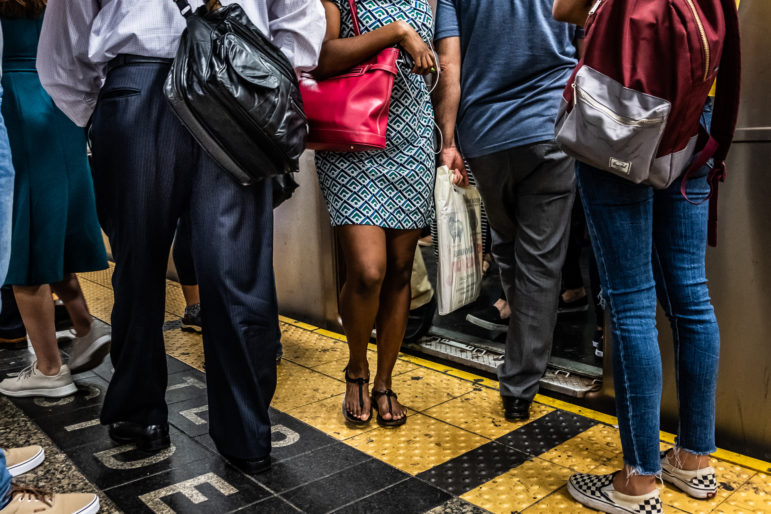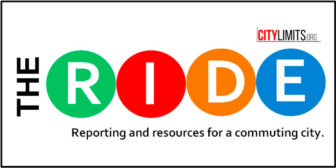
Adi Talwar / City Limits
Subway commuters at Grand Central Terminal on 42nd Street on a Tuesday morning in 2018.
Sheldon Burke emailed City Limits last week with a critique of the transit system. We encouraged him to compose the following op-ed. It’s widely recognized that the MTA needs big ideas and comprehensive improvements. But sometimes it’s the little things that make a commute pleasant or purgatorial. Comment below if you want to addy or gripes to this list–or take issue with any of the ones Burke makes here:
I. An MTA Policy that Aggravates Riders
An MTA policy designed to help passengers is extremely annoying and helps no one. Passengers standing on subway platforms and riding on subways and buses are usually subject to incessant loudspeaker announcements, literally one every two minutes. Almost all these announcements are insignificant and completely unnecessary. One example is “Thank you for riding the MTA”.
These announcements disturb people who want to read, listen to music with headphones or talk to their companions, as well as those who just want peace and quiet during their trip. If someone wanted to discourage people from riding public transit, he couldn’t do a better job than the MTA does with its incessant announcements. Only absolutely essential announcements should be made.
II. Allowing Music in Subway Stations Creates Problems
Allowing music in subway stations is a terrible mistake. Many riders dislike certain types of music and they shouldn’t be forced to listen to music they find annoying. Also, the music disturbs people who want to read or talk to their companions, as well as those who just want peace and quiet. Bands in some stations play extremely loud electrically amplified music that sounds like the noise in a factory. If someone wanted to discourage people from riding the subway, he couldn’t do a better job than some subway musicians.
Musicians not only annoy people, they also create two dangerous situations. For one thing, many station platforms are dangerously overcrowded during peak hours as well as some non-peak hours. Musicians, especially small bands, increase the danger simply by unnecessarily occupying platform space. For another, any music hinders hearing emergency loudspeaker station announcements. It’s essential riders hear these announcements and subway musicians make it difficult or impossible to hear what is being said. Playing music in subway stations should be prohibited.
III. The Wrong Approach to Decreasing Bus Travel Time
The major problem with bus service and the major reason for lost ridership is the excessive total time it takes to make a trip, especially the wait time at the bus stop. The MTA is implementing a number of measures when it should concentrate on just two measures that would accomplish more than all the others combined.
Bus bunching is by far the major problem and the MTA has done virtually nothing. A wait of 20 minutes or longer is common, even when buses are scheduled to run every every three or four minutes. A one mile trip requiring a transfer can sometimes take over an hour. Washington DC has a system that has virtually eliminated bus bunching and UC Berkeley and several research groups have each proposed their own solution. The MTA should determine which solution is best and implement it in NYC.
Fare prepayment has proven to significantly reduce travel time; examples are the M79 and M86 routes. However the MTA has implemented fare prepayment only on a small fraction of the routes; it should be implemented as soon as possible at every bus stop on every route.
IV. Safety Hazards Inside Buses
Double-decker buses are used for public transit in many other countries. Passengers have been injured in the stairwells; a 2019 New Zealand Herald online report cited seven Auckland bus stairwell accidents, including a fatal one.
Most NYC MTA buses have a similar hazard; they’re split-level with stairs leading to the upper level in the back of the bus. Some buses have an additional hazard, some seats are a foot above floor level; passengers must climb a steep step before sitting down, must climb down after getting up from their seats and are in danger of falling off their seats while the bus is moving. The fact that other cities have split level buses does not excuse having them in New York. Any stairs in the interior of a bus is an obvious safety hazard; it’s incredible the MTA decided to buy buses with these hazards!
Sheldon Burke is a retired computer programmer who was born in Brooklyn and moved to Manhattan in 1977.
Get the best of City Limits news in your inbox.
Select any of our free weekly newsletters and stay informed on the latest policy-focused, independent news.










2 thoughts on “Opinion: Four MTA Mistakes No One Talks About”
Clean Bus and Train Windows, particularly LIRR and commuter trains. Dirty windows have a negative psychological effect and detract from the viewing experience, a critical part of the total travel experience.
Why do the subway operators make important announcements when the train is moving? They cannot be heard clearly over the noise and it is really frustrating to discover too late how one’s travel plans will be affected.